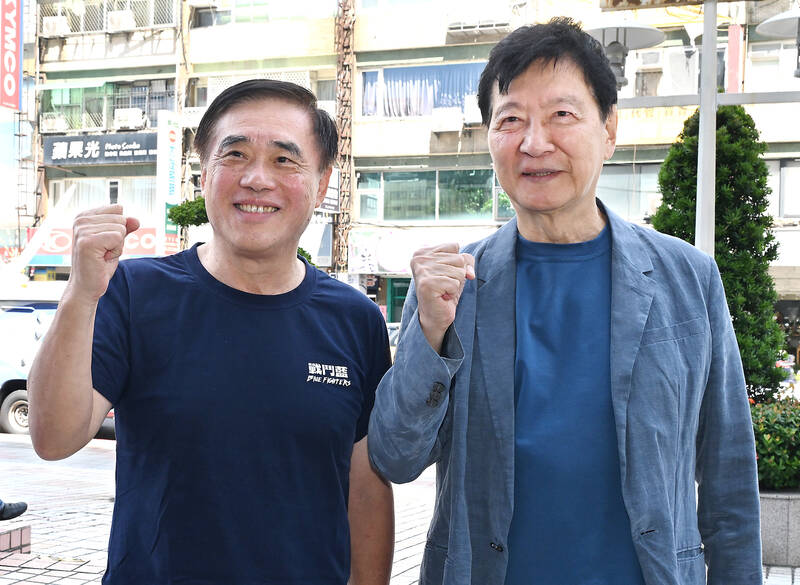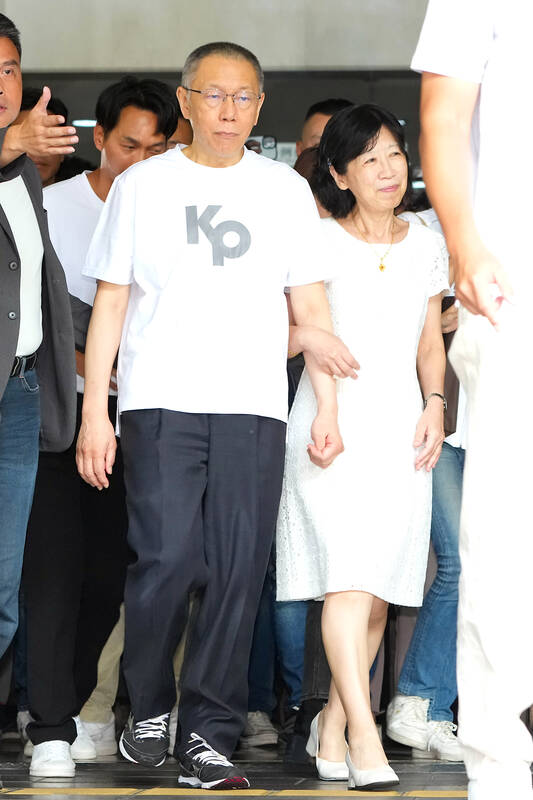Taiwan politics in the local Chinese-language media presents a far richer, more complex and human picture.
There are long, evolving story arcs packed with colorful characters — often with unexpected twists and absurdities in the “you can not make this stuff up” category. They are fascinating and can add considerable insight into the people involved, their motivations and their aims.
Very little of this makes it into the English-language press, which has far fewer resources and so focuses on the bigger picture. However, in the process, it strips away much of the color, vibrancy and context critical to understanding Taiwan politics.

Photo: Chen Yi-kuan, Taipei Times
With several key developing stories awaiting important developments, this is a good opportunity to delve into some of the stories dominating local coverage in the last week that humanize the bare-bones stories covered in English.
PEGGY’S POST
The most unusual story last week was the allegation that Taiwan People’s Party (TPP) founder Ko Wen-je (柯文哲) caught the human papillomavirus (HPV) — normally classified as a sexually transmitted disease (STD) — from a toilet seat while in prison, which led to the development of a painful verruca (plantar wart) on his, ahem, posterior.

Photo: Liao Chen-huei, Taipei Times
The English-language press limited coverage to the important and consequential ongoing battle between the Taipei District Court and the High Court. The Taipei District Court has repeatedly released Ko from prison on bail, a decision prosecutors keep appealing successfully to the High Court to get revoked, so they can keep him jailed incommunicado.
Ko is still out on bail. The High Court rejected the decision and returned it to the district court, which reaffirmed its original ruling. The question remains if the High Court will overrule that and send him back to prison.
Making up lies about Ko getting an STD would be illegal, and if it were true, a serious violation of medical ethics to disclose that fact if the information was taken from a medical professional.
Ko will not be suing anyone in this case. The source is his own wife Peggy Chen (陳佩琪), posting on Facebook.
In her post, describing miseries and hardships her husband endured in prison, added that detail, saying it was Ko’s own self-diagnosis. Both Ko and Chen are medical professionals, with Ko’s specialty in organ transplants and Chen a pediatrician.
If you thought this would devolve into lurid speculation on Ko’s sex life in prison, that was not the case in the broad-spectrum media I follow.
Much of the reporting was on other medical professionals questioning this diagnosis. Verruca is normally associated with the bottom of the feet, and getting HPV from a toilet seat is extremely unlikely.
The real story here was about Chen, who has long been an Internet celebrity in her own right.
Many of her posts are intended to evoke sympathy, and she has a history of being very descriptive and personal in her posts. She has also been less than truthful in some of her posts and is suspected of exaggerating for dramatic effect.
This has put her front and center in local politics, and she has featured prominently in TPP rallies calling for the “martyr of democracy” Ko to be released from his “persecution” by the “weaponization of the judiciary” by President William Lai (賴清德). She has likened the prosecution’s hoped-for 28.5-year sentence for Ko to an “execution.”
When the wife of a co-defendant in Ko’s corruption cases threw herself off a building, Chen wailed at a rally: “It should have been me.” Ko’s supporters stopped her from going through with it.
As a pediatrician, she is well aware of the controversy surrounding offering HPV shots to all first-year junior high school students, which created widespread awareness of it as an STD. Dermatologists and gynecologists cited in the press all doubted the diagnosis, so if it is unlikely Ko has it, why write this?
Why did she not wait for test results to confirm it before writing this? Did Ko know she was going to post this, and did he approve of it?
I do not doubt the genuineness of her emotions. After repeatedly expressing them without filter, she found an outpouring of sympathy and concern from Ko’s “little sprout” supporters and the TPP.
My theory is this set off a positive feedback loop of emotional support for her, which also simultaneously helped build sympathy for freeing her husband.
JAW’S CHOICE
Last week also revealed another interesting human story between Jaw Shaw-kong (趙少康) and Hau Lung-bin (郝龍斌) regarding the Chinese Nationalist Party (KMT) chair race. This is a critical race for the KMT, and the candidates are already in a bitter battle to define the heart and soul of the party for years to come.
Jaw initially said that if Hau was going to run, he would not. Then, it was agreed between them that they would use two days of opinion polling to determine which was the more popular.
On social media, I commented that Jaw would win the polling and would therefore be the candidate. I was wrong.
The first day’s results showed Jaw coming in first place ahead of former legislator Cheng Li-wun (鄭麗文), leading her with 29.9 percent support to her 19.4 percent. If the candidate were Hau, he came in second to Cheng, trailing her at 20.5 to her 22.2 percent.
There were no second day polling results released. After the first day’s results, Hau and Jaw met and talked “late into the night.” The next day, it was announced that Hau would be the candidate.
Jaw is a powerful figure, a media mogul, and famous talk show host. He was the KMT’s vice presidential candidate last year and founded the Blue Fighters (戰鬥藍), a grouping of deep blue, mostly Taipei-based political figures.
He is a larger-than-life character, brimming with eloquent bravado. Why did he walk away from running for such a powerful position capable of shaping Taiwan’s politics ahead of two critical election cycles the KMT currently appears to be in a strong position to do well in?
Both defected from the KMT and were among the founders of the pro-unificationist New Party in 1993. They are longstanding comrades-in-arms, sharing a similar deep-blue ideology.
Jaw is the more popular and powerful of the two, and is better placed to carry forward their ideological vision. He has a bigger platform and following, and is highly articulate.
From their ideological perspective, running Hau is riskier than running Jaw. Hau has already run for KMT chair twice and was soundly and humiliatingly defeated.
Some nervousness was apparent when Jaw accompanied Hau to speak to the press, saying a vote for Hau was a vote for him, effectively acknowledging his fears that his supporters are not as excited about Hau as they are about him.
Hau may have pitched Jaw with some practical arguments, such as Jaw might have to give up control of the Broadcasting Corporation of China (BCC) if he became chairman, or that both of their platforms combined might be more powerful than one alone.
Those arguments have a little merit, but not much. Jaw could keep his platform as chairman, and would probably do both better than Hau. Jaw has also already risked losing BCC by running for vice president.
More likely, the 74-year-old Jaw recognized that this was his 73-year-old friend’s last chance for relevance and achievement in life. Hau’s career once looked bright, but flatlined after serving two terms as Taipei mayor.
It appears Jaw picked loyalty to his friend over personal political gain.
Donovan’s Deep Dives is a regular column by Courtney Donovan Smith (石東文) who writes in-depth analysis on everything about Taiwan’s political scene and geopolitics. Donovan is also the central Taiwan correspondent at ICRT FM100 Radio News, co-publisher of Compass Magazine, co-founder Taiwan Report (report.tw) and former chair of the Taichung American Chamber of Commerce. Follow him on X: @donovan_smith.

The primaries for this year’s nine-in-one local elections in November began early in this election cycle, starting last autumn. The local press has been full of tales of intrigue, betrayal, infighting and drama going back to the summer of 2024. This is not widely covered in the English-language press, and the nine-in-one elections are not well understood. The nine-in-one elections refer to the nine levels of local governments that go to the ballot, from the neighborhood and village borough chief level on up to the city mayor and county commissioner level. The main focus is on the 22 special municipality

The People’s Republic of China (PRC) invaded Vietnam in 1979, following a year of increasingly tense relations between the two states. Beijing viewed Vietnam’s close relations with Soviet Russia as a threat. One of the pretexts it used was the alleged mistreatment of the ethnic Chinese in Vietnam. Tension between the ethnic Chinese and governments in Vietnam had been ongoing for decades. The French used to play off the Vietnamese against the Chinese as a divide-and-rule strategy. The Saigon government in 1956 compelled all Vietnam-born Chinese to adopt Vietnamese citizenship. It also banned them from 11 trades they had previously

Jan. 12 to Jan. 18 At the start of an Indigenous heritage tour of Beitou District (北投) in Taipei, I was handed a sheet of paper titled Ritual Song for the Various Peoples of Tamsui (淡水各社祭祀歌). The lyrics were in Chinese with no literal meaning, accompanied by romanized pronunciation that sounded closer to Hoklo (commonly known as Taiwanese) than any Indigenous language. The translation explained that the song offered food and drink to one’s ancestors and wished for a bountiful harvest and deer hunting season. The program moved through sites related to the Ketagalan, a collective term for the

As devices from toys to cars get smarter, gadget makers are grappling with a shortage of memory needed for them to work. Dwindling supplies and soaring costs of Dynamic Random Access Memory (DRAM) that provides space for computers, smartphones and game consoles to run applications or multitask was a hot topic behind the scenes at the annual gadget extravaganza in Las Vegas. Once cheap and plentiful, DRAM — along with memory chips to simply store data — are in short supply because of the demand spikes from AI in everything from data centers to wearable devices. Samsung Electronics last week put out word